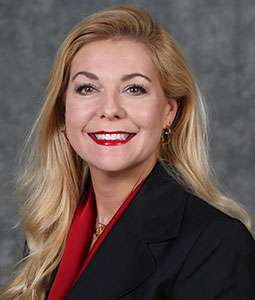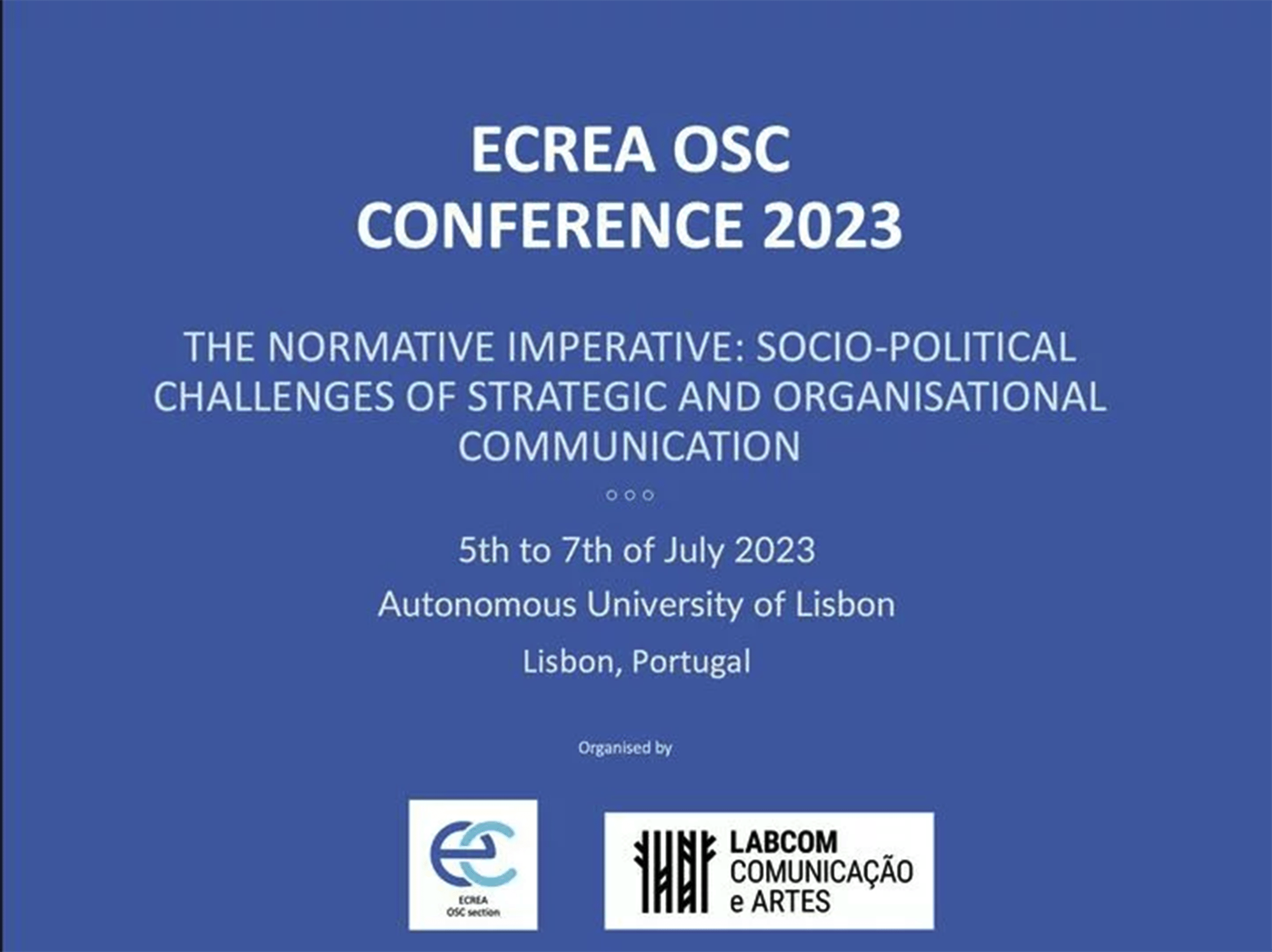The interim ECREA OSC conference to take place from 5th to 8th of July 2023 in the Universidade Autónoma de Lisboa, in a joint organisation with LabCom – Research Center.
About the conference
MFor far too long, the focus of applied communication has been in proving value and getting a place at the manager’s table. We followed blind the growth imperative and an economic model centred on the financial efficiency. In the years, some academics were looking for identifying added-value of communication to the management game from a hegemonic perspective. Nevertheless, it was also a position of never being able to be a game changer, but rather a follower. It even charged also public sector with efficiency from a management centered perspective.
We see then a change in the public sphere and in the social dynamics. Society intensified the game of legitimation of organisations with hashtags movements and global awareness. CSR, sustainability, diversity, equity, inclusion are now well widespread buzzwords in the corporate realm. Organisations feel the normative imperative, taking care of societal issues and even play a role in political discussions, as seen in corporate social advocacy and CEO activism. On the other side, corporate hypocrisy and soft propaganda are ongoing, and the media landscape and its watchdog role seems to be diminishing.
For sure companies and even more public sector have always had a contract with society. A contract that comprises not just direct stakeholders (as employees, consumers, citizens or shareholders) but also broader publics (as the media, the nonprofit sector or the communities where the organisation operate). Of course, there are laws and regulations, the formal part of this social contract; but there are also semi-formal aspects, which are much more fluid and difficult to ascertain: the stakeholders’ expectations regarding companies conduct, like following environmental or labour ideals, or the fulfillment of brand promises. Violations may result in swift actions by stakeholders, fueled by social media boycotts, for example, but they can also go unnoticed. With excuses of endless use of rhetorical figures and a permissive attitude towards communication endeavours and brand communication, we let organisations preach their stories and narratives without hardly any accountability on their communication.
We invite the community to reflect upon the scope of those thoughts and to submit critical, empirical or theoretical proposals for the interim ECREA OSC conference to take place from 5th to 7th of July 2023 in the Autonomous University of Lisbon, in a joint organisation with LabCom – Research centre. Evandro Oliveira and Gisela Gonçalves are the organisers.
Conference topics
- Normative governance for organizational communication
- Normative frameworks for strategic communication
- Impact of brand rhetoric and narratives on society
- Regulatory implications for the public sector
- Non-profit and hypocrisy
- Impact of communication on consumer identity and well-being
- B-corps as a new approach to relationship management
- Accountability, integrated reporting and communication
- 4th sector communication
- Greenwashing and other “image” washing.
- Strategic Communication and the UN Sustainable Development Goals
- Corporate social advocacy and CEO activism
- Internal relationship management and well-being
Scholars and postgraduate students of Organizational and Strategic Communication. Students are encouraged to take advantage of the formal and informal mentoring opportunities afforded by participating in the conference and other section activities. The conference provides members with valuable professional development opportunities, including networking and presentation, and learning about the latest trends in Organizational and Strategic Communication research.
Submissions are now closed. Full papers can be considered for two publications:
1- A special issue of the “Communication Studies” journal- Scopus, Latindex, open source (http://ojs.labcom-ifp.ubi.pt/index.php/ec/about/submissions)
2- An edited book by Evandro Oliveira & Gisela Gonçalves (Publisher tbc)
———————————————————————————————————————————————–
Scientific Programme
July 5th
17:30 | Registration opens
Autonomous University of Lisbon (UAL) main building – R. de Santa Marta 561150-140 Lisboa, Portugal
18:00 | Opening session (Sala dos Atos UAL) followed by a port of honour and informal get together
Prof. Dr. Reginaldo Rodrigues de Almeida
Vice president of the Autonomous University of Lisbon and communication sciences department head
Prof. Dra. Gisela Gonçalves
LabCom Research Center board member, University of Beira Interior, past ECREA OSC chair and local organiser
Prof. Dr. Evandro Oliveira
ECREA OSC chair, LabCom research associate, Autonomous University of Lisbon and local organizer
July 6th
UAL | Auditory 1
9h00 – 10h30 | Session 1
Panel | Activism and corporate purpose
Chair: Gisela Gonçalves (LabCom and University of Beira Interior)
Active citizenship, companies and purpose: the perspective of Spanish society
Isabel Ruiz Mora, Belén Barroso & Alejandro Álvarez Nobell (University of Malaga)
Corporate purpose and its communication in small and medium-sized enterprises – How purpose orientation helps to achieve strategic communication goals
Michael Johann, Daniel Ziegele, Leonie Beck, Tanja Graf, Xenia Grohmann, Leonard Landau, Christina Lehmann, Adrian Liehr, Friederike Rummeni, Laura Wettengel & Sabrina Zierer (University of Leipzig)
The PR Excellence Theory and the Strategic PR Model: Aegon Santander case study
Matilde Almeida & Susana de Carvalho Spínola (CAPP, ISCSP, University of Lisbon)
The impact of CEO Activism in Brand Reputation: the PROZIS case
Alexandre Duarte (ICNOVA, Nova University Lisbon)
Celebrity communication management and fan charitable participation: Towards the assimilation of symmetrical communication in entertainment public
Loarre Andre Perez (DaLI Lab, University of Oklahoma)
Coffee break
11h00 – 12h30 pm | Session 2
Panel | Human rights, gender and public interest
Chair: Isabel Ruiz-Mora (ECREA OSC past chair and University of Malaga)
Portuguese women in the strategic communication industry: perceptions on gender equality dimensions
Maria João Cunha, Carla Cruz & Fábio Anunciação (CAPP, ISCSP, University of Lisbon)
Public Sector Communication and Gender Perspective. A Pilot Study on Social Media Practices of Italian Regions
Marica Spalletta (Link Campus University), Gea Ducci (University of Urbino), Lucia D’Ambrosi (Sapienza University of Rome), Camilla Folena (University of Urbino)
Communicating for change: Strategies used by Portuguese Feminists Groups – Success and Challenges
Ana Sofia Pereira, Sónia Lamy, Carla Cerqueira & Célia Taborda (CICANT, Lusófona University, CICANT)
When human rights are out of the game: an analysis of the silencing of national teams during the 2022 World Cup
Fernando Rocha & Ricardo Morais (LabCom, University of Beira Interior)
Public Interest Communication and the Advocacy Strategies of Non-Profit organizations: The case of ODIF in Cape Verde
Ana Barreto (ICNOVA, Nova University Lisbon), Nuno Brito (Autonoma University of Lisbon and ICNOVA)
Lunch
14h00 – 15h00 | Keynote speaker
The normative imperative: Ethics
Shannon A. Bowen (University of South Carolina)
15:00 – 16:30 | Session 3
Panel | Digital communication and public engagement
Chair: Alessandro Lovari (ECREA OSC vice chair and University of Cagliari)
Challenges of digital communication in universities’ role in society: analysis of social media posting strategy
Ileana Zeler (Autonomous University of Barcelona), Paul Capriotti (Universitiy Rovira i Virgili), & Andrea Oliveira (University of Malaga)
Corporate Lobbying on Sustainable Finance: How Financial Lobbying Drives Negative Engagement Behavior on Twitter
Vesile Cinceoglu (University of Zurich), Matias Lievonen (University of Jyväskylä), & Nadine Strauß (University of Zurich)
Online strategic health communication. Communicating skin-cancer prevention in Spain.
Ángeles Moreno, Lara Jiménez-Sánchez (University Rey Juan Carlos), & Ileana Zeler (Autonomous University of Barcelona)
No Such Thing as Bad Publicity? Dialogic Shaping of AI Innovation by Companies, News, and Social Media
Tessa Oomen, João Gonçalves & Lara Jiménez-Sánchez (Erasmus University of Rotterdam)
Behind the scenes of the matchmaking between private for-profit sector and cultural and creative sectors during pandemic
Caterina Foà & Catarina Pessoa Godinho (CIES-ISCTE, University Institute of Lisbon)
Coffee break
17h00 – 18h30 | Short presentations session
Chair: Ileana Zeler (ECREA OSC vice-chair and University Autonomous of Barcelona)
The Paradox of CSR Communication: Best Practices to Combat the Paradox
Bárbara Costa (Polytechnic Institute of Coimbra), & Alexandra Leandro (CECS, University of Minho)
Estrella Barrio-Fraile (Autonomous University of Barcelona)
Doctoral research on CSR in Spain: before and after the SDGs
When green is not green: The message of the awareness campaign against greenwashing, by the Portuguese Association for Consumer Protection (DECO PROTEST)
Célia Belim & Raphael Baptista (CAPP, ISCSP, University of Lisbon)
30 years of scientific production on the role of CEOs in the institutional communication of organizations: bibliometric analysis from 1993-2022
Giancarlo Saavedra-Chau & Paul Capriotti (Universitiy Rovira i Virgili)
From Engagement to Activism: What publics are demanding of organisations
Patrícia Dias (Catholic University of Lisbon) & José Gabriel Andrade (CECS, University of Minho)
Solving challenges of internal communication during the times of uncertainty in public sector: the case study of Lithuanian ministry
Vytautas Beniusis (Vilnius University)
An outlook on the role of employees in organizational communication: The power of microboundary-spanners
Loarre Andre Perez, Kyoungmin Lee & Jeong-Nam Kim (DaLI Lab, University of Oklahoma)
20h15 – Walking tour
Gathering at Rossio Square (near the fountain). The tour ends at the restaurant.
21h30 | Conference Dinner
Restaurante Atalho Real – Calçada do Patriarcal, 40.
July 7th
UAL | Auditory 1
10h00 – 11h30 | Session 4
Panel | Public communication and public participation
Chair: Sónia Pedro Sebastião (CAPP, ISCSP, University of Lisbon)
The challenges of communicating the Italian Recovery Plan: Investigating models, strategies, practices, and rhetorics.
Francesca Comunello (University of Rome), Alessandro Lovari (University of Cagliari), Alessandro Marinelli & Leonardo Piromelli (University of Rome)
University Fourth Mission and nowadays society. Ethic imperative and relational challenges in the context of high education in Italy
Lucia D’Ambrosi, Valentina Martino & Paolo Brescia (Sapienza University of Rome)
Public Relations Role and Media Data Strategies Issued by Saudi Governmental Organizations During the Covid-19 Pandemic Crisis
Mutaz Alotaibi (Cardiff University)
Social participation in public organization: a case study of Santa Catarina’s Prosecutor Office (MPSC)| Access to justice, reduction of inequality and litigation gaps – the case of Israeli litigators
Gisiela Klein (University of Coimbra) & Clerilei Bier (State University of Santa Catarina)
Nudge and thermalism: A theoretical reflection on developing communication strategies to enhance wellbeing
Vera Antunes, Gisela Gonçalves & Cristina Estevão (LabCom and NECE, University of Beira Interior).
Coffee break and
12h00 – 13h00 | Professionals’ Hour
Moderation: Evandro Oliveira (ECREA OSC Chair, LabCom, Autonomous University of Lisbon)
Inês Simões, president of APCE (Portuguese Association of Corporate Communication) and CCO for corporate communication, brand and organizational culture from the AGEAS group.
Paula Portugal Mendes, board member of the Global Alliance for PR and Communication Management
Lunch
15h00 – 16h30 | Session 5
Panel | Trust and sustainability narratives
Chair: Michael Johann (ECREA OSC Young Scholar, University of Ausgburg)
The sustainability narrative challenge: the Secil Group media framing in Portugal
Andreia Melchiades Soares (CAPP, ISCSP, University of Lisbon)
Analysis of Institutional Communication strategies on Green Hydrogen in the Euro-Mediterranean Region
Nazih Toubal (Autonomous University of Barcelona)
Nuclear energy as green? Analysis of the news media impact of the European Parliament’s declaration on the Complementary Delegated Act
Riasat Muhammad Amir (Autonomous University of Barcelona)
Going Beyond Obligatory Disclosure – The Identity Projection of Public Agencies, As Invitation for Social Judgement
Eva Kaponia (Nova University Lisbon)
Habermas’s communicative action and the constructivist-relational theory as references for the communication of sustainability in organizations
Lauralice Ribeiro & Paula Ribeiro (University of Coimbra)
One Thousand and One Days. Trustworthiness Perception in Startups and Emerging Brands: The Role of Brand Narrative, Story Doing, and Trust Triggers
Nivea Heluey Morante (Autonomous University of Barcelona)
16:30 | Closing Ceremony and farewell drink
———————————————————————————————————————————————–
Pre-event
Workshop on Digital Methods (max. 25 participants)
July, 5th
09:00-12:00 and 13:00-16:00

Dr. Ramón Rodriguez-Amat – https://orcid.org/0000-0001-8391-3638 – Past-chair of ECREA OSC and Lecturer at Sheffield Hallam University, UK.
Basic data analytics with Python (crash course workshop) – Morning
This is a taste for newcomers to the fascinating world of python for data analytics. After a brief presentation of what digital data and social media and streaming platforms are; we will use Microsoft Visual Studio Code and Anaconda Jupyter Notebooks to explore real datasets. After that you will learn how to visually represent them, and how to use the visual representations and the skills to draw some early conclusions. You will also get further useful resources if you wish to grow further that road.
Note you will need to bring your own laptops and you will be asked to install the software yourselves before the session. Help for the installation can also be provided.
Network data analytics with Gephi (crash course workshop) – Afternoon
This is a taste for newcomers to the fascinating world of network data analytics. After a brief game and a presentation of what networks mean and how they are relevant for social media analytics; we will use Gephi to explore real datasets. After that you will learn how to visually understand networks, and how to use the network representations to draw some early conclusions. You will also get further useful resources if you wish to grow further that road
Note you will need to bring your own laptops and you will be asked to install the software yourselves before the session. Help for the installation can also be provided.
Registrations
ECREA and SOPCOM members: 25 Euros for 1 Workshop; 40 Euros for both.
PhD Students: 20 Euros for one and 30 for Both
NON-ECREA members: 50 Euros 1 Workshop and 80 Both
———————————————————————————————————————————————–
GUEST KEYNOTE SPEAKER

SHANNON A. BOWEN
University of South Carolina
Dr. Shannon A. Bowen is an Associate Professor in the School of Journalism and Mass Communications at the University of South Carolina where her research focuses on ethical decision making within the highest levels of organizations. She teaches and researches ethics across corporations, pharmaceutical firms, governmental entities, and the public relations industry. Bowen is one of three joint-editors for the journal Ethical Space: The International Journal of Communication Ethics.
Dr. Bowen sits on the Board of Trustees of the Arthur W. Page Society, the Board of Directors of the non-profit International Public Relations Research Conference (IPRRC), serves several journal editorial boards including the Journal of Mass Media Ethics, and is a Contributing Editor of Media Ethics magazine. She has published in numerous journals and won several awards, including top paper awards, an ethics grant from the International Association of Business Communicators, and the Jackson Jackson & Wagner Behavioral Science Research Prize.
Until 2012, Dr. Bowen was tenured in the S I Newhouse School of Public Communications at Syracuse University, but was happy to return home to South Carolina. Her Ph.D. is from the University of Maryland; her dissertation on Kantian ethics won the Robert Heath Outstanding Dissertation Award. Her MA in Journalism and Mass Communication is from the University of South Carolina, and her BA is from the University of North Carolina at Chapel Hill.
Registration
Early Bird – until May 10th
- ECREA/SOPCOM Members 100 euros (two lunches, coffee breaks and welcome drink)
- Academics 130 euros (two lunches, coffee breaks and welcome drink)
- Professionals 150 euros (two lunches, coffee breaks and welcome drink)
- PhD Students with presentation 45 euros (coffee breaks and welcome drink)
- Participation-only PhD students 25 euros (coffee breaks and welcome drink)
Gala dinner – 40 euros
After May 10th until June 14th
- ECREA/SOPCOM Members 130 euros (two lunches, coffee breaks and welcome drink)
- Academics 160 euros (two lunches, coffee breaks and welcome drink)
- Professionals 180 euros (two lunches, coffee breaks and welcome drink)
- PhD Students with presentation 75 euros (coffee breaks and welcome drink)
- Participation-only PhD students 35 euros (coffee breaks and welcome drink)
Venue, accommodation and travels:
The conference will take place at Palácio dos Condes de Redondo – Universidade Autónoma de Lisboa, in the centre of Lisboa.
https://goo.gl/maps/PrYwJYNZGwVCNKui7
Conference Hotel at special rate Dom Carlos Liberty 3*, please insert the promo code while booking:
Special rates:
Single Room
Double Room
https://www.domcarloshoteis.com/dom-carlos-liberty/
Other good accommodations nearby without special rate:
Inspira Liberdade Boutique Hotel 4 * https://inspirahotels.com
EPIC Sana 5* https://www.sanahotels.com/pt/hotel/epic-sana-lisboa/
Budget Options:
Easy Hotel https://www.easyhotel.com/de/hotels/portugal/lisbon/lisbon
Lisbon Top Hostel (Dormitory): https://www.booking.com/Share-2G2QMx
Scientific Committee
Chairs and local organizers:
Dr. Evandro Oliveira (LabCom and Universidade Autónoma de Lisboa)
Dr. Gisela Gonçalves (LabCom and Universidade da Beira Interior)
Members:
Dr. Alessandro Lovari (ECRES OSC Management Team and Università di Cagliari, Italy)
Dr. Ana Melo (CECS and Universidade do Minho, Portugal)
Dr. Andrea Oliveira (Universidad de Málaga, Spain)
Dr. Bruno Reis (LabCom and Universidade Autónoma de Lisboa, Portugal)
Dr. Ileana Zeler (Universitat Autònoma de Barcelona, Spain)
Dr. Isabel Ruiz-Mora (Universidad de Málaga, Spain)
Dr. Reginaldo de Almeida (Universidade Autónoma de Lisboa, Portugal)
Dr. Ramón Rodriguez-Amat (Sheffield Hallam University, UK)
Dr. Sónia de Sá (LabCom and Universidade Autónoma de Lisboa, Portugal)
Dr. Sónia Pedro Sebastião (CAAP and ICSP – Lisboa, Portugal)
Dr. Teresa Ruão (CECS and Universidade do Minho, Portugal)
UAL Media Coordinator:
Carlos Pedro Dias (Universidade Autónoma de Lisboa)
ECREA OSC Management Team:
Chair: Evandro Oliveira (LabCom and Universidade Autónoma de Lisboa, Portugal)
Vice-chair: Ileana Zeler (Autonomous University of Barcelona, Spain) and Alessandro Lovari (University of Cagliari, Italy)
YECREA: Michael Johann (Augsburg University, Germany)
Contact:
Please contact us via ecreaosc@gmail.com for any questions.












